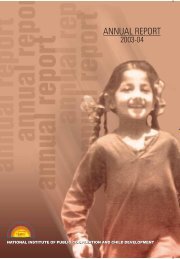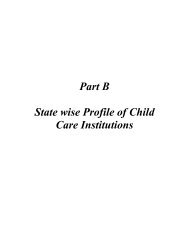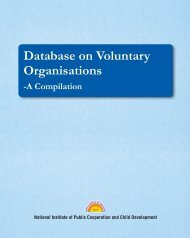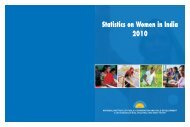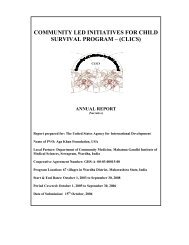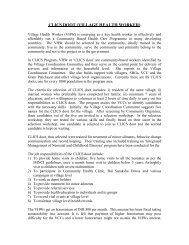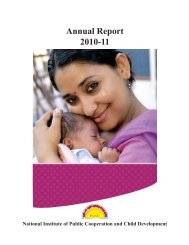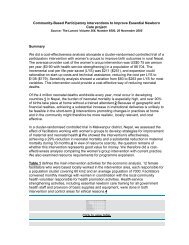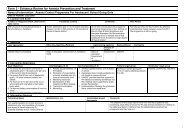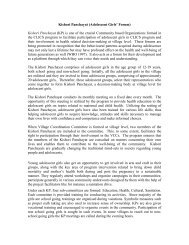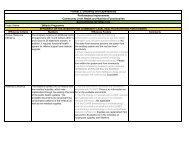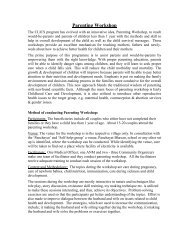Research Abstracts on Child Labour Women Labour - Nipccd
Research Abstracts on Child Labour Women Labour - Nipccd
Research Abstracts on Child Labour Women Labour - Nipccd
Create successful ePaper yourself
Turn your PDF publications into a flip-book with our unique Google optimized e-Paper software.
Girl <strong>Child</strong> <strong>Labour</strong><br />
Sinha, Shantha. (2004).<br />
From girl child labour to students in formal school : reallocati<strong>on</strong> of work in families.<br />
Secundrabad : M. Venkatarangaiya Foundati<strong>on</strong>. 15 p.<br />
Key Words : 1.CHILD LABOUR 2.GIRL CHILD LABOUR 3.GIRL CHILD 4.HOUSEHOLD ACTIVITY<br />
5.ROLE OF GIRLS IN HOUSEHOLD 6.GIRLS EDUCATION.<br />
Abstract : For girls in rural areas, working is a widely accepted way of life from the age of<br />
5 years. They support their mothers by doing outdoor work, look after their siblings, and<br />
they also work in st<strong>on</strong>e and lime quarries, where they carry head loads of earth and rubble<br />
from pits at least 50 feet deep. Very few girls have spare time for play or school. This<br />
study was c<strong>on</strong>ducted in Rangareddy district of Andhra Pradesh. Nearly 1000 eligible girls<br />
aged 8-15 years from 225 families were c<strong>on</strong>tacted. The average family size was six, and<br />
literacy rate am<strong>on</strong>g the populati<strong>on</strong> was 50%. Only 20% had educati<strong>on</strong> up to primary level,<br />
and <strong>on</strong>ly 2% had accessed college educati<strong>on</strong>. About 90% children aged 5-14 years were in<br />
school and the remaining were engaged in <strong>on</strong>e or the other form of labour. Girls also took<br />
care of animals after they came home from grazing, and if the girls went to school, animals<br />
were sold because no family member was available to look after them. Participati<strong>on</strong> of girls<br />
in agricultural work was 20%, and a few went for wage work <strong>on</strong> holidays to supplement the<br />
family income. The MV Foundati<strong>on</strong> programme aimed at universalizing educati<strong>on</strong> am<strong>on</strong>g girls<br />
and made efforts to encourage families to send girls to school. The main activities girls<br />
were engaged in were fetching water, washing clothes, going to the market, delivering food,<br />
fetching firewood, cleaning the house and fr<strong>on</strong>t yard, cleaning utensils, child care, house<br />
security and cooking. A significant part of the burden of the work d<strong>on</strong>e by girls subsequent<br />
to their enrolment was d<strong>on</strong>e by the female members of the family, especially the mother.<br />
Male members took up outside activities, but with the majority of boys in schools, the work<br />
was initially transferred to girls, and now it went back to adult male members. It was found<br />
that sibling care was not an issue as this work was not reallocated. The current study<br />
indicated the elaborate arrangements made by family members to retain their children in<br />
schools. The study also indicated that in order to withdraw girls from work, the mother has<br />
to be str<strong>on</strong>gly motivated since she is the <strong>on</strong>e who has to bear the brunt of the withdrawal<br />
of the girl child from work.<br />
38<br />
<str<strong>on</strong>g>Research</str<strong>on</strong>g> <str<strong>on</strong>g>Abstracts</str<strong>on</strong>g> <strong>on</strong> <strong>Child</strong> <strong>Labour</strong>, <strong>Labour</strong> and <strong>Women</strong> <strong>Labour</strong> 1998 - 2009



